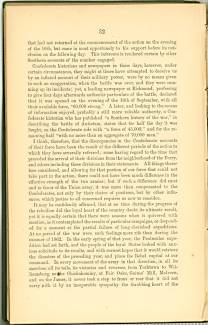Collection Name
About
that had not returned at the commencement of the action on the evening of the 16th, but came in most opportunely to his support before its conclusion on the following day. This inference is rendered certain by other Southern accounts of the number engaged.
Confederate historians and newspapers in those days, however, under certain circumstances, they might at times have attempted to deceive us by an inflated account of their military power, were by no means given to such an exaggeration, when the battle was over, and they were summing up its incidents; yet, a leading newspaper at Richmond, professing to give four days afterwards authentic particulars of the battle, declared that it was opened on the evening of the 16th of September, with all their available force, "60,000 strong." A later, and looking to the means of information enjoyed, probably a still more reliable authority, a Confederate historian who has published "a Southern history of the war," in describing the battle of Antietam, states that for half the day it was fought, on the Confederate side with "a force of 45,000," and for the remaining half "with no more than an aggregate of 70,000 men."
I think, therefore, that the discrepancies in the Confederate accounts of their force have been the result of the different periods of the action to which they have severally referred; some having regard to the time that preceded the arrival of their divisions from the neighborhood of the Ferry, and others including these divisions in their statements. All things therefore considered, and allowing for that portion of our force that could not take part in the action, there could not have been much difference in the effective strength of the two armies; but if such a difference did exist and in favor of the Union army, it was more than compensated to the Confederates, not only by their choice of positions, but by other influences, which justice to all concerned requires us now to consider.
It may be confidently affirmed, that at no time during the progress of the rebellion did the loyal heart of the country doubt its ultimate result, yet it is equally certain that there were seasons when it quivered with emotion, as it contemplated the results of particular campaigns, or desponded for a moment at the partial failure of long cherished expeditions. At no period of the war were such feelings more rife than during the summer of 1862. In the early spring of that year, the Peninsular expedition had set forth, and the people of the loyal States looked with anxious solicitude to its results, and with earnest hopes that it would retrieve the disasters of the preceding year, and place the Rebel capital at our command. In every movement of the army in that direction, in all its marches, all its toils, its victories and reverses, from Yorktown to Williamsburg, on the Chickahominy, at Fair Oaks, Gaines' Mill, Malvern, and on the James, it never took a step to front or rear that it did not carry with it by an inseparable sympathy the throbbing heart of the
